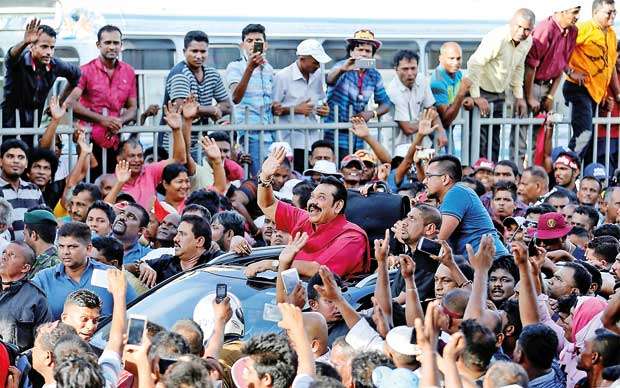Reply To:
Name - Reply Comment

Former President Mahinda Rajapaksa still has a say in whether the joint opposition should agree to forming a caretaker govt.
 All hell broke loose in the Government after the news spread that President Maithripala Sirisena met with his predecessor Mahinda Rajapaksa at the Colombo residence of MP S. B. Dissanayake ostensibly to discuss the formation of a new Government.
All hell broke loose in the Government after the news spread that President Maithripala Sirisena met with his predecessor Mahinda Rajapaksa at the Colombo residence of MP S. B. Dissanayake ostensibly to discuss the formation of a new Government.
In this instance, it created rumblings within the United National Party (UNP) which is the main constituent of the national Unity Government. The UNP MPs started harbouring fear whether their Government would be unseated under the developing circumstances. Of course, they have valid reasons to believe so, though. First and foremost, the political relationship between the UNP and President Sirisena has soured beyond redemption at the moment. At such a moment, any communication between the President and the former President definitely fuels speculation that a new political formation is in the making to dislodge the UNP from office at the earliest.
No sooner did the news appear to this effect the UNP backbenchers conducted press conferences to announce that it would opt for the formation of its own Government casting aside the President’s Sri Lanka Freedom Party (SLFP) in such an eventuality. UNP MP for the Kurunegala District Thusara Indunil Amarasekara said that his party could rope in six SLFPers to ensure the 113 seats required for the simple majority in Parliament to run the Government in its own.
Likewise, the UNP MPs started making subtle salvos at the President for such inclination towards the political opposition. Deputy Minister of Law and Order Nalin Bandara Jayamaha, who is a regular holder of press conferences on behalf of the party, said he hoped the President would not throw his lot behind a cabal of persons who worked against him at the Presidential Elections in 2015.
All these are indicative of the UNP’s fear that the President would discard them to form a new Government ahead of major elections due next year.
However, what transpired during the meeting at S.B. Dissanayake’s residence is shrouded in secrecy. In fact, the participants themselves did not want it to be leaked to the media that even such a thing happened. Things got out of their hand finally. It is no longer a secret that the meeting took place. It is learned that Dissanayake got a rap from the President for leaking out information to the press in this regard.
Against such developments, the MPs, who identify themselves with Sri Lanka Podujana Peramuna (SLPP), converged at the residence of its Chairman Prof. G.L. Peiris on Tuesday evening for what they called ‘a frank discussion’ with former President Mahinda Rajapaksa. Though the meeting was supposed to commence at 7.00 am, the deliberations really got off at 7.30 pm because some MPs were late to arrive after parliamentary proceedings.
The event drew much attention from the media and politically savvy people given the political context in which it took place. Rajapaksa presided over the meeting. In his address, Rajapaksa categorically said that there was no reason for him nor his party to take the initiative to form the interim government, as it was squarely with the President to act upon if he was genuine.
He said it should be formally initiated by President Sirisena as the person with authority at the moment. He said the SLPP or the Joint Opposition could respond only in the event of such formal initiative by the President.
“Until such times, there is nothing for us to do,” he said.
Alongside, he said he could not be intimidated into forming such an alliance by threatening to put his family members behind bars through legal action.
“Some people say I am going to join the government to cover up legal cases pending against my family members. There are others saying that I seek to join hands with the President fearing electoral defeat otherwise. This is not the case. I cannot be intimidated by any of these acts to join a new alliance,” he said.
The upshot is that if and when there is an invitation from the President, the SLPP will consider its response.
 Also, Rajapaksa requested everyone present not to comment on this matter publicly any further as otherwise it could lead to confusion.
Also, Rajapaksa requested everyone present not to comment on this matter publicly any further as otherwise it could lead to confusion.
The participants expressed their views both for political understanding with the President and against it. Responding to them, Rajapaksa said that there was scope for interpretation of it in different ways.
“There is nothing for us to do now. It has to come from their side,” he said.
Also, they were to have a meeting with the other parties aligned with the Joint Opposition yesterday evening. For that, it was decided to invite the 15 members who defected from the Government. At the moment, S.B. Dissanayake and a few others were mediating between Rajapaksa and President Sirisena.
The Rajapaksa camp is dealing with the subject with skepticism because it believed the President let them down during the vote of no confidence against Prime Minister Ranil Wickremesinghe.
Meanwhile, Rajapaksa, at Tuesday’s meeting, stressed that his MPs should make it a point to maintain quorum in Parliament. Some MPs also expressed views in this regard and stressed the need to take up their parliamentary businesses seriously.
At Tuesday’s meeting, former Minister Basil Rajapaksa, who spearheads the SLPP, admitted that he met with President Sirisena. He did not elaborate much on what was discussed. He said he requested the President to ensure safety of the members of Rajapaksa family facing threats at the moment.
At the meeting, Kandy District MPs Keheliya Rambukwella and Mahindananda Aluthgamage pressed for the need to establish a Government before the elections in understanding with the President. Nevertheless, Kalutara District MP Kumara Welgama was vehemently opposed to any such governing arrangement with the current President.
Hambantota District MP Chamal Rajapaksa, who is also the elder brother of Mahinda Rajapaksa, also took a similar stance. To drive home his point effectively, he said people would boot out all of them in the event of forging ties with the current rulers.
Ratnapura District MP Ranjith Zoysa was yet another MP who stood against the formation of a Government.
Anuradhapura District MP Shehan Semasinghe showed some flexibility in this exercise. He opined that though he was opposed to the idea of forming a Government, he would fall in line with the final decision of Mahinda Rajapaksa.
These arguments and counterarguments left Mahinda Rajapaksa in a difficult position in making a decision. Finally, everyone agreed that the Joint Opposition should not commit towards anything unless a formal request is made by the President. All in all, it means the move to form an alternative government remains open.